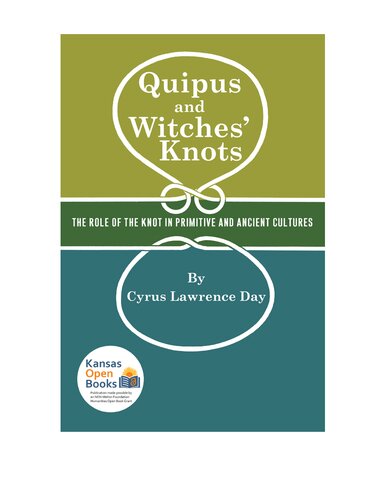

Most ebook files are in PDF format, so you can easily read them using various software such as Foxit Reader or directly on the Google Chrome browser.
Some ebook files are released by publishers in other formats such as .awz, .mobi, .epub, .fb2, etc. You may need to install specific software to read these formats on mobile/PC, such as Calibre.
Please read the tutorial at this link: https://ebookbell.com/faq
We offer FREE conversion to the popular formats you request; however, this may take some time. Therefore, right after payment, please email us, and we will try to provide the service as quickly as possible.
For some exceptional file formats or broken links (if any), please refrain from opening any disputes. Instead, email us first, and we will try to assist within a maximum of 6 hours.
EbookBell Team

4.0
76 reviewsThe Role of the Knot in Primitive and Ancient Cultures. With a Translation and Analysis of “Oribasius De Laqueis”
This essay in cultural anthropology provides a comprehensive view of the way primitive people in all parts of the world once utilized knots; mnemonic knots—to record dates, numbers, and cultural traditions; magic knots—to cure diseases, bewitch enemies, and control the forces of nature; and practical knots—to tie things and hold things together. In his discussion of mnemonic knots, the author analyzes the Peruvian quipus (or knot-calendars and knot-records) and suggests that the Inca astronomer-priests, known to have been accurate observers of the movements of the planets, may also have been able to predict the dates of lunar eclipses; and he shows how it is possible to manipulate the Ina abacus in accordance with the decimal system. His treatment of magic knots includes instances from Babylonian times to the present, with curious examples of the supernatural power attributed to the Hercules knot (i.e., the square knot) in Egypt, Greece, and Rome. His analysis of a little-known treatise on surgeons’ slings and nooses, written by the Green physician Heraklas, is the first detailed account of the specific practical knots used by the ancient Greeks and Romans. Quipus and Witches’ Knots, which is abundantly illustrated, often surprises the reader with the unexpected ways in which the once universal dependence of men on knots has left its mark on the language, customs, and thought of modern civilized peoples.